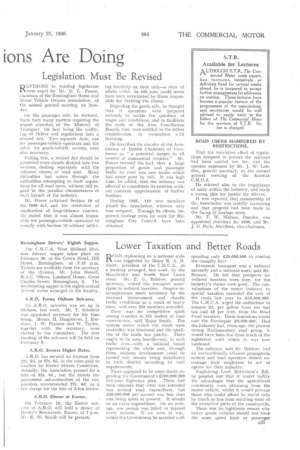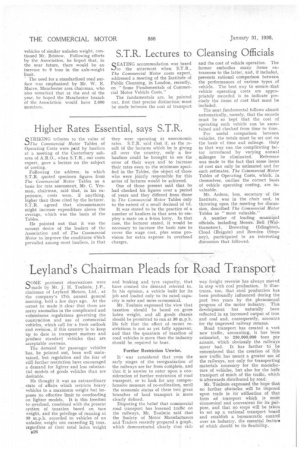Lower Taxation and Better Roads
Page 35

Page 36

If you've noticed an error in this article please click here to report it so we can fix it.
R"AD replanning.on a national scale was suggested by Major R.' A. B. Smith, president of the C.M.U.A., at a meeting arranged, last week, by the Manchester and South East Lanes areas. Mr. F. G. Bristow,' general secretary, voiced the transport users' claim to reduced taxation. Despite rearrangements made necessary by the national bereavement • and chaotic traffic conditions as a result of heavy snow, well over 200 members attended.
There was • no competitive spirit among counties in. th`b matter of road construction, said Major Smith. The system under which the roads were controlled was irrational and the qualities of the roads too patchy. There ought to be area boards—say, in each traffic area—with a national board representing the whole and, through them, uniform development could be carried out, money being distributed to each district according to road requirements.
There appeared to be some doubt regarding the Government's £100,000,000 five-year highways plan. There had been rumours that what was intended was normal road expenditure, but £20,000,000 per annum was less than was being spent at present. It should be an extra expenditure. On an average, one person was killed or injured every minute. If we were at war, would the Government be satisfied with spending only £20,000,000 to cam hat thecasualty list?
Economic transport was a national necessity and a national asset, said Mr. Bristow. He felt that prospects for reduced taxation were rosy, for the industry's claims were good. The contributions of the motor industry to special taxation exceeded the cost of the roads last year by £15,000,000. The C.M.U.A. urged the authorities to remove 2d. per gallon from the fuel tax and 25 per cent, from the Road Fund taxation. These remissions would cost the Exchequer £9,000,000. Had the industry had, years ago, the present strong Parliamentary road group, it would have been free from much of the legislation with which it was now burdened.
The railways, said Mr. Bristow, had an extraordinarily efficient propaganda system and road operators should encourage their employees to act as agents for their industry.
Explaining Lord Mottistone's Bill, ho pointed out that it would nullify the advantages that the agricultural community were obtaining from the motor vehicle, whilst it would prevent those who could afford to travel only by-coach or bus from reaching some of the attractive parts of the countryside, There was no legitimate reason why heavy goods vehicles should not have the same speed limit as passenger vehicles of similar unladen weight, continued Mr. Bristow, Following efforts by the Association, he hoped that, in the near future, there would be an increase to 9 tons in the axle-weight limit.
• The need for a standardized road surface was emphasized by Mr. W. E. Macve, Manchester area chairman, who also remarked that at the end of the year, he hoped the Manchester branch of the Association would have 2,000 members.




















































































